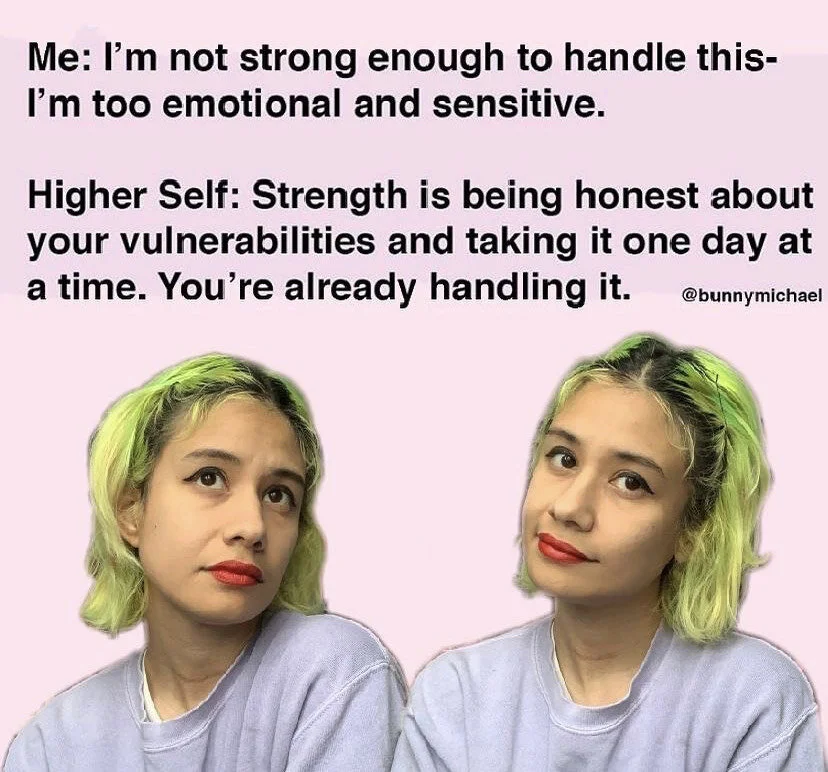A Roadmap to Self-Acceptance
How to embrace all of you
What does self-acceptance mean?
Self-acceptance is the act or state of complete acceptance of oneself with the awareness and understanding of one’s own capabilities and limitations. Self-acceptance means embracing not only the “good” or positive parts of ourselves, but embracing the uglier, scarier, more vulnerable parts too.
Why is it important?
Learning to truly accept ourselves helps us to develop an understanding that we are separate from our actions. Your mistakes are mistakes, but not a direct representation of who you are, and they absolutely do not define you. Self-acceptance is an important tool in creating an authentic life, strengthening our relationship with ourselves, and ultimately living a more fulfilling life.
hOW TO BEGIN self-accepting
Acknowledgment. Our mistakes and flaws are real parts of who we are that require acknowledgment to heal. Self-acceptance doesn’t mean that you condone or embrace any unhealthy or harmful behaviors and actions. Accepting yourself fully is acknowledging your negative characteristics, behaviors, and actions and rather than approving them, accepting them.
Confrontation. t’s time to confront the ugly, unhealthy, even harmful beliefs we’ve carried around all this time. To continue growing and bettering ourselves we have to confront ourselves about the “bad” parts. Is there something that you think you should feel bad or guilty for? Whose standards are you using? Work through these hard questions by being removing your letting go of your ego, and choosing vulnerability instead. Learn from your mistakes and commit to growth.
Commitment. The road to radical self love and self-acceptance is a hard one! It’s uncomfortable to confront certain biases, beliefs, and past behaviors. But to accept ourselves fully, it’s important that we commit to working through those hard emotions. Give yourself grace but keep yourself accountable too!
Support System. Yes, someone cares about you! Find your cheerleaders and try to be around people who lift you up. There’s absolutely no shame in asking for help or assurance. A few years ago, a friend of mine and I had a vulnerable conversation about self-love and self-esteem. She said, “You know what, sometimes I just want a compliment” Since then, we agreed that any time one of us was feeling especially down about ourselves, we could reach out with a simple “What do you like about me?” and be met with a genuine affirming response. Sharing spaces of vulnerability with others can help us gain self compassion.
Forgiveness. What are you blaming yourself for? What shame or guilt have you been carrying? Practice self-love by forgiving yourself for your past. Try writing yourself a letter, openly forgiving yourself to stop the pattern of self punishment. Mistakes are human and inevitable, aim to be your best self but give yourself the space to stumble sometimes.
4 SELF-ACCEPTANCE EXERCISES
replace negative self talk with positive affirmations
We all have cognitive distortions and negative narratives that we tell ourselves or believe about ourselves. These constant worries can take the shape of mantras we repeat to ourselves constantly. Things like, “I’m so ugly.”, “Everyone hates me.”, “I’m being annoying.”, “No one actually wants me here.”
We can’t stress enough how important our inner dialogue is. By replacing negative thoughts with positive ones, we can help re-program the way we speak to ourselves,
Try folding a piece of paper in half and writing all of the negative phrases or “stories” you find yourself repeating. On the other half of the paper mirror those thoughts with positive affirmations.
For example,
I hate the way I look.
would be mirrored with something like:
My body deserves love and respect.
See our list of downloadable affirmation cards above, and click here for DIY affirmation cards and how to use them.
Visualize your higher self
Artist Bunny Michael. Click here to listen and subscribe to their new podcast, XO Higher Self.
Our higher selves aren’t the “perfect” version of ourselves. Visualizing our higher self is giving a voice and body to our intuition.
Allow yourself time each day to be silent, still, and present. This emotional and physical space can help us to reconnect with our higher self or intuition. which holds a lot more wisdom than we give it credit for! Listening, and even visualizing a more conscious version of ourselves is an important tool in self-reflection and radical self-acceptance.
Try visualizing (drawing is even better!) your higher self. Think of it as positive affirmations coming to life! Think about past arguments you’ve had, or situations you wish you would’ve handled better and write down what your higher self would do.
This change in perspective allows us to see ourselves separately from our judgments, mistakes, and flaws, and find value in our higher consciousness.
Reflect on your past accomplishments
Honor yourself by celebrating your greatness. When you start to doubt yourself, take a minute to look back to the things that you’ve accomplished. Try making a list of things about yourself that you find pride in (this can look like anything!). Show yourself proof that you were capable of life’s challenges in the past, and capable of more in the future.
Remember that success is not defined by profit or wealth. Success is the accomplishment of a purpose and you get to decide what purpose that is. Did you face your fear of public speaking? Did you earn a degree? Did you speak up when it was hard? Did you honor your boundaries by letting go of someone toxic? Celebrate your achievements, and know your worth. You deserve it.
Click here to read more on self-doubt and how to shake imposter syndrome.
Give gratitude
Click here to access our Gratitude Journal and start the 15 day challenge!
There is so much power in giving gratitude to the good in our lives. Even negative experiences are worthy of gratitude.
Rather than thinking, “I should never have done that.” Try thinking, “I did the best I could with the knowledge that I had at the time, I’m grateful to have grown and be aware of the importance of this.” Ask what about your imperfections you are grateful for? What have they done to serve you?
Use our gratitude journal for 15 days of gratitude prompts to help guide you in your journey to self-acceptance.
Remember to give yourself grace in this journey. Authentic self-acceptance is liberating, but often times hard and uncomfortable too. Try not to beat yourself up about falling back into negative patterns. Instead, be mindful of your stumbles and gently pick yourself back up. This process is growth and you’re doing it exactly right.



































ADHD in adults—and especially in women—is finally getting the recognition it deserves. For years, countless women were misdiagnosed or overlooked because their symptoms didn’t look like the stereotypical “hyperactive boy.” Instead, they battled quiet chaos: disorganization, overwhelm, forgetfulness, and the creeping anxiety that follows.
The latest research shows that treating ADHD often reduces anxiety by addressing the root causes of daily stress—executive functioning challenges like planning, time management, and emotional regulation. From practical strategies like the OHIO technique (“Only Handle It Once”) to calming evening rituals that reset the brain, there are concrete tools that can transform frustration into confidence.
If you’ve ever wondered why anxiety seems to follow your ADHD everywhere, this post will help you connect the dots—and give you actionable steps to build structure, find calm, and finally feel in sync with your brain.